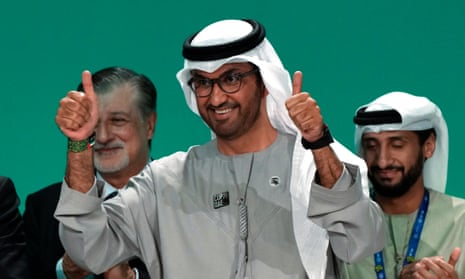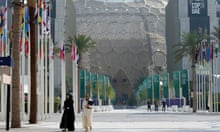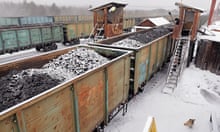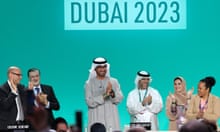The president of the Cop28 climate summit will continue with his oil company’s record investment in oil and gas production, despite coordinating a global deal to “transition away” from fossil fuels.
Sultan Al Jaber, who is also the chief executive of the United Arab Emirates’ national oil and gas company, Adnoc, told the Guardian the company had to satisfy demand for fossil fuels.
“My approach is very simple: it is that we will continue to act as a responsible, reliable supplier of low-carbon energy, and the world will need the lowest-carbon barrels at the lowest cost,” he said, arguing that Adnoc’s hydrocarbons are lower carbon because they are extracted efficiently and with less leakage than other sources.
“At the end of the day, remember, it is the demand that will decide and dictate what sort of energy source will help meet the growing global energy requirements,” he added.
He referred to the findings of the Intergovernmental Panel on Climate Change that the world will still need a small amount of fossil fuel in 2050, even when reaching net zero greenhouse gas emissions, which is required to limit global temperature rises to 1.5C (2.7F) above pre-industrial levels.
Al Jaber said his investment plans were viable within the 1.5C limit. “The world continues to need low-carbon oil and gas and low-cost oil and gas,” he said. “When the demand stops, that’s a completely different story. What we need to do right now is to decarbonise the current energy system, while we build the new energy system.”
Adnoc is planning a $150bn investment (£120m) over seven years in oil and gas, which Al Jaber said would maintain current production levels rather than increase output. He said Adnoc was forgoing much of its potential extraction.
“We have the fifth largest oil reserves in the world but we are not harnessing these resources,” he said in an exclusive interview after the summit.
Al Jaber was widely praised by delegates at the Cop28 summit, which ended on Wednesday morning with a global agreement calling on countries to “contribute to … transitioning away from fossil fuels in energy systems, in a just, orderly and equitable manner, accelerating action in this critical decade, so as to achieve net zero by 2050 in keeping with the science.”
It marked the first time in 30 years of climate talks that a global resolution had been made addressing the future of all fossil fuels. The deal was acknowledged as nowhere near enough to stave off the worst impacts of the climate crisis, and was criticised by developing countries for failing to provide them with assurances of much-needed finance, but was widely hailed as an important step.
Despite widespread consternation earlier this year over his dual role as head of Cop28 and of Adnoc, Al Jaber proved a popular Cop president. Developing countries at the summit said Al Jaber was listening and responding to their concerns, while rich countries spoke well of his determination to forge a consensus deal.
Al Jaber, who before taking on the Adnoc role co-founded the UAE government-backed renewable energy company Masdar in 2006, told the Guardian: “I am committed to the transition [to a low-carbon world]. This is something I have personally worked on for more than 18 years now. I know energy dynamics and energy economics. I’m an engineer.”
He argued that his position as a businessman and oil company chief had helped him bring off the surprise deal. “Through my presidency, we proved and we showed the world that having an industry leadership of a Cop was not a weakness. In fact, it was a strength, it was an advantage,” he said.
after newsletter promotion
Climate campaigners criticised Al Jaber’s plans for Adnoc. Harjeet Singh, the director of global engagement for the Fossil Fuel Treaty Initiative, said: “As the presiding nation of Cop28, UAE must set a precedent. Wealthy countries need to demonstrate tangible action to honour the spirit of the Paris agreement. Anything else casts a shadow of doubt over the hard-earned resolutions made at the Dubai climate conference.”
David Tong, an industry lead at Oil Change International, said: “Al Jaber has made it clear he is very proud of the UAE consensus [the deal that emerged from Cop28]. Now he needs to implement it in the company he leads, and transition away from oil and gas, or make a mockery of this process.”
Catherine Abreu, a senior associate at the E3G thinktank, said forecasts showed that demand for oil and gas would soon fall. “Every fossil fuel producer thinks their fossil fuels are special, non-climate change-causing fossil fuels, and for decades they’ve been able to hide behind a global climate agreement that failed to make the connection. But the veil is finally torn off and, too slowly, but surely, the situation will change,” she said.
Al Jaber hailed the deal struck at Cop28 as “unprecedented” and “historic”. He revealed some of his feelings as the negotiations dragged on from Tuesday night into the early hours of Wednesday, after a first draft of a potential agreement from the negotiations had been strongly rejected.
After many hours of no sleep and shuttle diplomacy, in which he held personal meetings with every country grouping at the talks and the representatives of many individual nations, he said he looked around at 2.30am on Wednesday to see the UAE’s negotiating rooms full of people and began to feel hopeful that a new draft text would be accepted.
“That was the moment where I suddenly realised that I was watching consensus coming to life, that’s when I realised really that, OK, something’s happening here,” he said. “I realised then that I started connecting to their own hearts, to their own minds, and they started helping to better shape the plan. And I realised that, OK, we are about to make history. And that’s really when I doubled down and that is when I really got my full motivation.”










